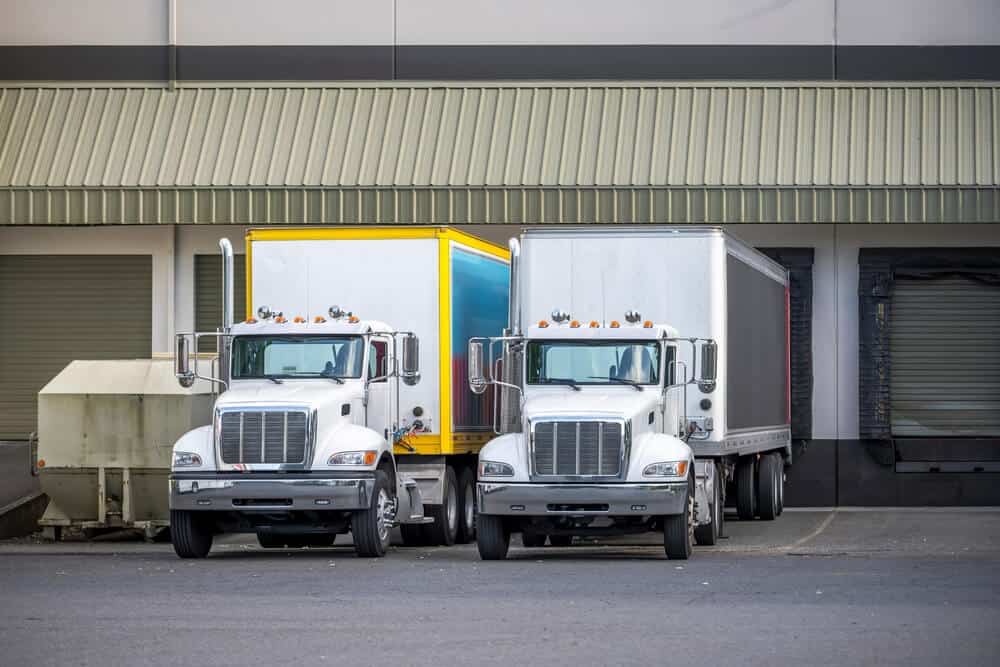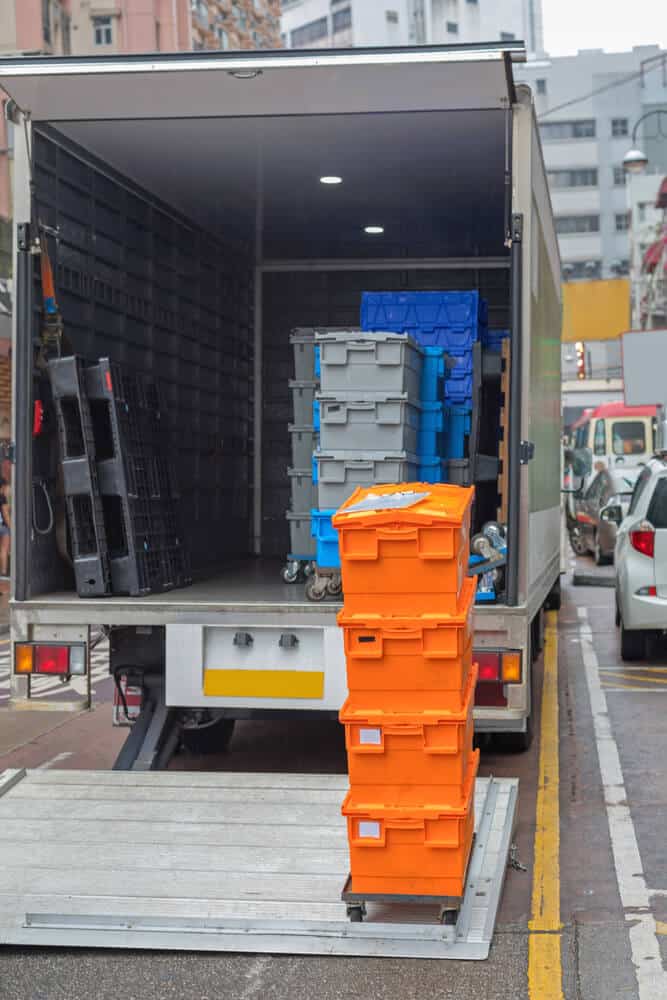Box trucks are the go-to for everything from short-haul to use as moving vans. Depending on your needs, they fit into every niche – from refrigerated truck to mid-duty cargo vehicle to band vehicle.
But, if you want to buy one, that also means prices can vary – a lot.

For example, a secondhand box truck can go for as little as a few thousand dollars. But if you’re looking for new ones, the average box truck cost usually ranges between $35,000 and $100,000.
These costs depend on make, model, features, and any extras like refrigeration.
Compare Car Warranty Quotes For Free & Save Big!
Topics
New & Used Box Truck Costs
In most cases, the most significant factor impacting the cost of a box truck is the age of the vehicle. Here, a new model purchased from the dealership will cost the most.
In this case, you’re unlikely to see a vehicle under $35,000.
| Truck | New MSRP | Secondhand |
|---|---|---|
| Isuzu N Series | $44,000+ | $5,000+ |
| Ford Econoline | $53,655+ | $1,600+ |
| Freightliner M2 | $115,998+ | $3,120+ |
| Hino 268 | $69,900+ | $3,857+ |
| Mitsubishi FUSO FE160 | $64,500+ | $5,200 |
| Ford F750 | $63,425 | $8,414 |
If you’re buying secondhand, pricing mostly depends on the age and condition of the vehicle. Truck sale forums are full of box trucks of every make and model.
Often, they start out as cheap as a few hundred dollars. Those same prices will go up to over $100,000 depending on the make, model, and age of the vehicle.
In addition, a starting price doesn’t mean an average price.
For example, an Isuzu N Series normally starts out at around $44,000 brand new but with trim and upgrades, can nearly double that.
Ford’s Econoline starts at $34,130 for just the cutaway and starts with an MSRP of $53,655 in box truck format but you can get it up to over $80,000.
A larger model, like a Freightliner M2, starts at around $115,998 but goes up to around $160,000 depending on upgrades.
So, pricing can range quite a bit.
Box Truck Price Factors

There are many factors influencing the cost of purchasing a truck of any kind.
For a box truck, the factors normally include the condition of the truck, size, weight class, and engine.
Condition
Second-hand vehicles vary significantly in price.
Here, the newer your vehicle, the more you should expect to pay, even secondhand. Normally, that’s gauged by a combination of age and odometer mileage.
For example, most commercial box trucks are expected to make about 1 million miles before they need a major repair. Any mileage off the odometer is considered a detractor from that.
At the same time, very low mileage on an older vehicle may be a bad sign as well. Sitting for long periods can cause significant engine damage.
So, most people look for a balance of age and mileage to look for a light-use but continuously used vehicle.
Make and Model
The make and model are always important.
A 10-year-old Freightliner will always sell for more than a 10-year-old Ford, unless something is seriously wrong with the Freightliner. That often has to do with weight class and engine rather than just the brand.
However, even for commercial box trucks, brands can impact costs a lot.
For this reason, you may want to shop around to compare some of the more budget box or cube truck brands.
In addition, the make and model include the engine and powertrain. In most cases, your engine and powertrain will make sense for the weight class of the vehicle you buy.
However, you may have specific needs. For example, you want your box truck for long haul. In that case, you’d want to ensure your engine can handle it.
On the other hand, you may want a high-horsepower engine. Box truck engines typically range from 300-510+ HP.
Weight Class
Box trucks are available in Class 3 to Class 7.
- Class 3 – Medium Duty, with a weight limit of 14,000 lbs.
- Class 4 – Medium Duty, with a weight limit of 16,000 lbs.
- Class 5 – Medium Duty, with a weight limit of 19,500 lbs.
- Class 6 – Medium Duty, with a weight limit of 26,000 lbs.
- Class 7 – Heavy Duty, with a weight limit of 33,000 lbs.
Weight class impacts what you’re legally allowed to put in the truck. It also impacts where you’re allowed to drive. For example, many cities have limitations on vehicles based on size.
In addition, a Class 4 box truck will always be cheaper than a Class 5 box truck. Often, the price difference can be as much as $10,000 per class.
Size
The physical volume of the cab and storage box will always impact the cost. Here, cubic square feet is the most important factor. However, you’ll also pay more or less based on factors like height, width, and depth.
Here, you do want to pay attention to what you’re getting because if you don’t need a very tall storage area, there’s no sense in paying for one.
Extras
The “standard” dry storage box truck is relatively easy to price. But, if you want extras like refrigeration, built-in cargo shelving, or built-in ramps, you’ll normally have to pay extra.
That can mean anywhere from several thousand extra for a refrigerator to a few hundred extra for shelves.
Benefits of Buying a Box Truck

Box trucks are a convenient and effective option for carrying cargo in most capacities.
For many, they replace a trailer, offer more security over an open truck, and offer more carrying capacity and hauling power than a van.
No Need for Trailer
If you’re frequently relying on a trailer to move cargo, switching to a box truck could save you a considerable amount of time and effort.
In addition, trucks are easier to maneuver, safer in urban areas, and significantly easier to store overnight.
More Storage Than a Van
Box trucks are typically significantly larger than vans, while still offering maneuverability and easy storage.
A standard 12-foot cargo van is about 404 cubic feet of space. A 12-foot box truck is 450. A 26’ box van is 1,700 cubic feet of space.
This means that at any point where having more cargo space is a concern, the box truck wins.
In addition, box trucks are safer to use for heavy and potentially dangerous cargo. That’s because the separate cabin means it’s less necessary strap things down to keep them away from the driver.
Security
Box trucks lock up, usually from a single door on the back. That makes it relatively easy to secure cargo, tools, or deliveries overnight or during delivery.
Vans are much harder to secure – because you’ll always have window and windshield access points.
Box Truck Brands
If you’re choosing a box truck, there are plenty of choices in the U.S.
Ford
Ford is one of the U.S.’s largest manufacturers of box trucks. In fact, Ford offers two of the most popular box trucks in the country: the Econoline and the F750.
In addition, the F350 is a lighter-weight and extremely popular cargo truck. If you purchase a secondhand U-Haul box truck, it’s very likely to be a Ford.
Isuzu
Isuzu’s N-Series (gas) and F-Series (diesel) are two of the most popular box trucks in the United States. These medium-duty trucks are lightweight, affordable, and designed to be cost-effective.
In fact, Isuzu calculates that the average buyer sees a return on investment using their vehicles from 20,000 miles of service per year.
Freightliner
Freightliner is one of the U.S.’ oldest semi-truck manufacturers. However, the Oregon-based company offers one of the leading medium-duty box trucks in the country, the M2.
In addition, as of 2022, that includes the eM2, a fully electric box truck.
Hino
Hino offers a range of light and medium-duty trucks for the American market. However, it’s a Toyota company, and the largest box truck manufacturer in Japan.
Hino is also one of the best-rated box truck manufacturers, with a 1 million-mile average lifespan on most of its trucks.
Mitsubishi
Mistubishi’s FUSO line is one of the most fuel-efficient options on the market. Mitsubishi offers medium-duty trucks and box trucks primarily designed for longer haul.
That makes FUSO a good choice if you’re looking at long or longer-haul rather than for a city truck.
Ram
Ram light and mid-duty box trucks are normally designed for heavier loads and duty.
The Dodge brand uses the classic RAM build with up to an 84” cab-to-axle length. This means you’ll have limited total storage, but the option to modify your RAM with a box and storage.
GMC
GMC is one of the largest manufacturers of box trucks in the U.S., because they, along with Ford Motors, manufacture most of the box trucks used by both Penske and U-Haul.
FAQs
If you still have questions about buying a box truck, this FAQ should help.
Are box trucks difficult to drive?
Box trucks are normally no more difficult to drive than a large pickup or van. However, if the gross vehicle weight rating is over 26,000 lbs., you’ll need a CDL to drive it.
The Isuzu N-Series starts out at around 23,950 lbs. empty for a class 4 vehicle.
Are most box trucks automatic?
Box trucks are available with both manual and automatic transmissions.
In many cases, manufacturers like Freightliner also allow you to choose which transmission you want.
How many gears does a box truck have?
The larger your truck, the more gears it will normally have.
This means that your box truck may have anywhere from 8-18 gears.
Are box trucks a good investment?
Box trucks can be a good investment, especially if you frequently move cargo.
However, you’ll have to do the calculation yourself to see how much you move with the truck, what your return on investment will be, and how much you’ll actually use it.
Next Steps
Purchasing a box truck will always mean doing research to see what you actually need and why. For example, you may need a small truck. You might also want to max out your size capacity. Researching to see which make and model best suits your needs and budget is also important, because costs can vary per area based on availability.
If you’re looking for a new truck, you can use our free tool to compare box truck quotes to see which make and model best fits your needs.
Compare Car Warranty Quotes For Free & Save Big!
